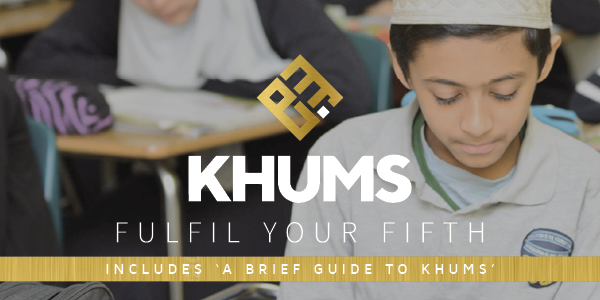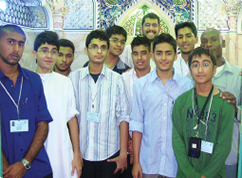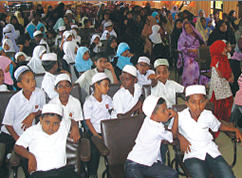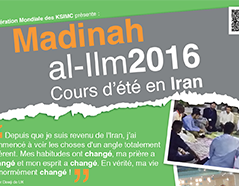Named after the great Prophet Abraham, who championed monotheism, this exhibition echoes the unanimous acclamation of monotheism in the three major faith traditions of Judaism, Christianity and Islam.

Quick Links: Watch the Khums Video | Download "A Brief Guide to Khums" | Pay your Khums | Khums App | Islamic Laws | Ask an Alim | iSistani App
‘Khums’ literally means ‘one-fifth’. In Islamic law, it refers to an obligatory (wajib) religious tax which one must pay on several things, the most common of which is surplus income from earnings and gains. The amount of khums one must pay on surplus income is 20%.
Khums payments are divided into two equal parts:
One half is given to the Imam (a) of the time; this is called ‘Sahm-e Imam’ (the portion for the Imam (a)). In the absence of the Imam (a), this part must either be given to a Marja-e Taqlid (i.e. a high religious authority who can be followed in matters of Islamic law), or to an individual or organisation that has been given permission (ijaza) to collect khums on behalf of the Marja. This portion is then used for worthwhile purposes authorised by the Marja.
The other half is given to sayyids (descendants of the great grandfather of the Prophet (s)) who are poor, orphans, or stranded travellers. This is called ‘Sahm-e Sadat’ (the portion for sayyids).
The World Federation is proud to have permission from His Eminence al-Sayyid Ali al-Sistani (may God protect all our scholars) to collect khums payments on his behalf and to disperse the Sahm-e Imam part on religious projects, such as our fantastic children’s education and teacher training programmes.
You can make your full khums payment, or either of the Sahm payments, online by visiting our donate portal and searching “khums”.
Alternatively, you can make your khums payment through your local Jamaat which will process your payment and transfer it to The World Federation through our regional member federations.
Our new easy-to-digest Khums Guide will give you a clear overview of the most essential rulings on khums. The Guide also explains the differences between the previous and new ruling on loans and includes worked examples which show how the new ruling applies in practice.
Essentially, the Guide tells you what khums is payable on, why we pay it, when to pay, who to pay, and where it goes.
More Information:

Our new easy-to-read Khums guide will guide you If you’ve never fulfilled this religious obligation before or need help understanding what’s eligible, why we pay it, when to start, who to pay, and where it goes. This guide includes the differences between the previous and new ruling recently published by His Eminence Ayatollah Sistani.

You can make your full khums payment, or either of the Sahm payments, online by visiting our donate portal and searching “khums”.
Alternatively, you can make your khums payment through your local Jamaat which will process your payment and transfer it to The World Federation through our regional member federations.

You can also download our Khums App, which will instantaneously help you to calculate your khums liabilities, set reminders for the future, and take payments to fulfil this beautiful and benevolent obligation. Find out more about the app here or download it now from the Google and Apple app stores.
You can view the detailed laws pertaining to khums in Islamic Laws, the third edition of a high-quality translation of the Tawdih al-Masa’il of His Eminence al-Sayyid Ali al-Sistani (may God protect all our scholars). To purchase a must-have copy of the latest edition of Islamic Laws, visit the WF Shop.
For specific questions about your situation, visit Ask An Alim, where you can submit a question and get a response from an Alim or view similar questions which may apply to you.

The app gives an individual experience that’s as user-friendly as it is resourceful. Once installed, you will be able to search multiple law manuals in one go, add your own notes to each law and bookmark any rulings you want to refer back to – giving you access to rightful practices right at your fingertips.
Related News
The martyrdom of Imam Hassan al-Askari (a.s), the Eleventh Imam of the Shi’a.
Updated 17 July 2013
This is the 10th issue of the MCE mailshot. When we sent the first issue, we explained that the purpose of the newsletter was to:
1. Update you on the progress made by MCE and its activities
2. Share good practices that are happening in other madrasah around the world
3. Share news of important developments in the field of madrasah education
4. Listen to you and take your feedback, suggestions and new ideas.



















